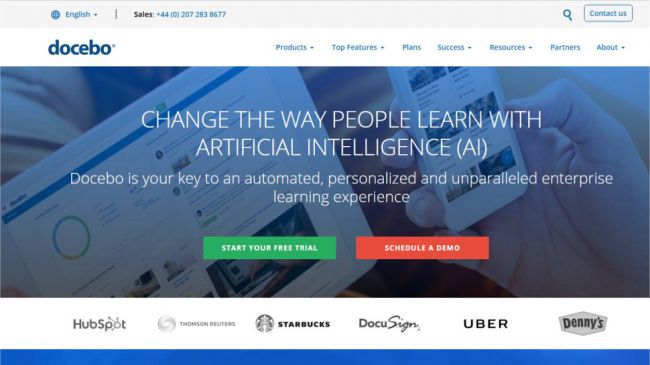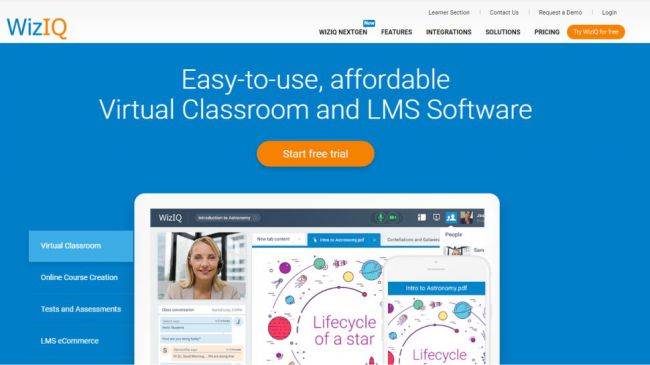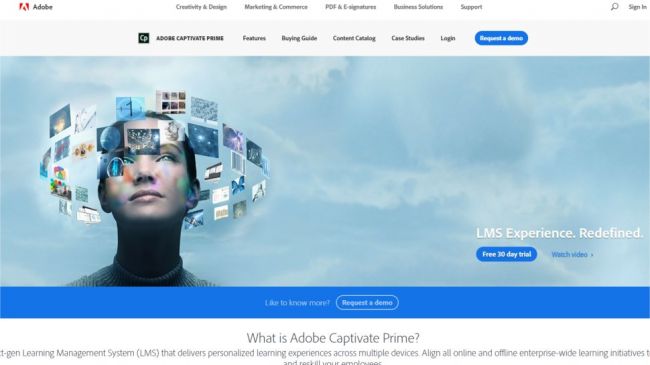
Online learning has blossomed over the past few years, with an increasing number of educational institutions offers distance learning courses via the Internet.
These days there are an increasing number of qualifications, even degrees, that you can learn online.
It’s not just academic training that has moved to the Internet, but also a whole slew of business development programs that aim to teach and broaden employee skills.
The challenge is to find a platform that that is easy to use and manage, not just for the educational provider or trainer, but also for the student or trainee.
Here we look at some of the best in online learning platforms, better known as Learning Management Systems (LMS), with a view that it may not just be a big university or enterprise that may be looking to educate or train staff, but also small companies or even sole traders looking to build up their own business.

1. Docebo
The collaborative learning platform
- Students able to interact
- Fully customizable
- Easy to use
Docebo is a Learning Management System (LMS) that helps you organize, track and distribute online courses for formal learning, be it for employees, clients or customers.
Instead of simply offering a one-way broadcast in its teaching solutions, Docebo encourages collaboration by allowing employees to ask questions and get answers from the relevant subject matter experts in their organization. Learners also able to share their own knowledge which can be validated through peer-review and shared across teams.
To help platform administrators effectively manage their organization’s skill and competency gaps, the Docebo Perform tool lets you assign formal and informal training sessions to those who may need upskilling in certain areas. The system is customizable too, so you can give it the appropriate look and feel according to your organization’s brand.
Docebo sports a slick, easy-to-use UI and comes with a wide range of third party integrations, so implementing the platform in your organization’s training schemes should be a smooth process. You can get a quote for a Docebo price plan via the link below.

2. Udemy
A thriving community for teachers, students and businesses
- Large number of courses
- Tools for monitoring user behavior
- Business plans not cheap
Udemy is well-recognized name in the world of online learning and now boasts over 15 million students, poring over more than 65,000 available courses.
There are two main plan options, Team and Enterprise. The Team Plan is available for 5-20 users to provide the basics, and costs $240. The Enterprise Plan comes with additional features, not least analytics to show user engagement, as well as Single Sign On (SSO) and various APIs. Both are available for a free trial or demo.
Meanwhile, organizations looking to utilize the service for a sustained period of time can opt for a Udemy for Business account. This unlocks more than 2,500 business-relevant courses designed to up-skill employees in specific areas. You can also measure learning engagement to find out what materials work best for individual employees, with insights on user behavior and learning patterns.

3. Skillshare
A learning community with a lean towards creativity
- Classes encourage ‘doing’, not just reading
- Niche skills covered
- No accredited courses
Skillshare describes itself as an online community for ‘creators’ and anyone who wants to teach can set up a class. These classes, some 21,000 of them, typically specialize in design, photography, business, technology, film and writing.
There are more than 3 million people in the Skillshare community, offering the chance to connect and share insights with people from various industries – a potentially valuable tool for freelancers and those who work in a niche industry. The platform encourages ‘doing’ rather than learning passively, with every class including a practical project with feedback on completion.
Skillshare can be used by teams too, with usage reporting tools enabling you to track the progress of team members. Price plans start at $99 (£75) per user per year, but with discounts available to organizations looking to sign up large numbers of employees.

4. WizIQ
Bring your lessons to the world
- Helps you reach a mass audience
- Mobile version available
- Good customization features
WizIQ is aimed more squarely at the teachers rather than students, offering virtual classroom and LMS software to those looking to teach and train others.
With WizIQ you can create and sell interactive courses that can be delivered as live classes or as materials to be studied at the pace students wish. These can be easily converted to MOOCs (massive open online courses) to maximize student enrollment around the world and grow revenue streams.
In terms of using WizIQ within an organization, users can create branded learning portals to train employees, clients, partners and customers via online tutorials or live classes. The design features are pretty extensive and easy to use for those keen to give their training courses a polished, professional feel. Conveniently, all classes can be enjoyed on the go via the WizIQ app for both iOS and Android devices.
WizIQ used to display pricing for its different tiers, but has now made them opaque so that you have to contact their sales team for a quote.

5. Adobe Captivate Prime
A typically comprehensive platform from Adobe
- Handy automation tools
- 24/7 support
- Gamification elements
Not many corners of the software world are left untouched by Adobe, and sure enough the computing behemoth has its own solution for the learning management market. Adobe Captivate Prime is an LMS platform for the enterprise that aims to make training easy-to-run and enjoyable to complete.
According to Adobe, courses can be rolled out in less than 90 minutes thanks to its suite of tools to get you set up. An online help center, in-product videos and 24/7 support also serve to help administrators on their way. Further smoothening the process are automation features than enable you to auto-assign learning plans, schedule reports and synchronize users.
Once the learning programs are set up, tracking tools allow you to monitor the progress and certifications obtained by users, with added insights showing how individuals, departments and partners are doing with their learning objectives. Other features include a flat UI for easy control and navigation without opening multiple pages, a recurring certifications feature that ensures your organization stays up-to-date on compliance, the ability to customize the learning experience for individual users, and gamification tools like leaderboard races and achievement badges.
A few more…
Canvas LMS is aimed at higher education and prides itself on prioritizing usability and reliability over supplying endless features. It’s an open source platform that invites collaboration and third-party plug-ins and is fully customizable for the user’s specific learning needs.
Create LMS is a multifaceted learning platform. It provides an LMS to track and process the training of employees, a custom courses tool to help you build your learning materials, and a library of readymade courses that number more than 20,000.
Another player on the LMS scene is Litmos. It’s easy-to-use interface and bank of pre-built courses provide a platform for employee training, customer training, channel training, and compliance.
Totara Learn is a feature-chock learning platform that claims to offer better value for money than proprietary services on the market. It enables users to create individual learning plans which reflect employees’ roles, training needs and objectives.
Complete with an e-commerce tool for monetizing your courses, automation features for easy administration and reporting dashboards that offer handy organization-wide insights, Absorb LMS is a worthy candidate for a company seeking out a high-quality learning management platform.
